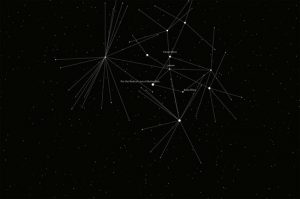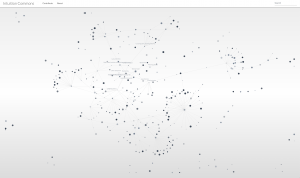 Christine D’Onofrio is an Instructor at the University of British Columbia, Department of Art History, Visual Art and Theory. She teaches and practices in lens-based and digital media. Her recently-launched user-content-generated archive site Intuition Commons aims to connect women artists and cultural contributors by way of intuitive, affective, and tacit links that inform creative output and ways of being in the world. User interaction activates the online archive as viewers navigate an array of narratives that fed a visual installation shown in the Fall 2018 exhibition Collective Acts at the Morris and Helen Belkin Art Gallery at UBC Vancouver. You can view her portfolio at http://www.christinedonofrio.com/
Christine D’Onofrio is an Instructor at the University of British Columbia, Department of Art History, Visual Art and Theory. She teaches and practices in lens-based and digital media. Her recently-launched user-content-generated archive site Intuition Commons aims to connect women artists and cultural contributors by way of intuitive, affective, and tacit links that inform creative output and ways of being in the world. User interaction activates the online archive as viewers navigate an array of narratives that fed a visual installation shown in the Fall 2018 exhibition Collective Acts at the Morris and Helen Belkin Art Gallery at UBC Vancouver. You can view her portfolio at http://www.christinedonofrio.com/
CHRISTINE D’ONOFRIO ON WORKING ON GENDER
My art practice consists of curiosities and provocations of how gender can influence a mode of inquiry, which hopefully brings about new ways of knowing. I question power structures, reveal oppressions, and bring attention to what is overlooked and/or silenced. My work uncovers these themes in different ways: through art-historical references, sometimes transferring into critiques of capital and more recently how gender has been empowered and/or privileged online. Interests in my art practice also influence my teaching, both in facilitation and content; I try to make space for historically overlooked voices or narratives –which also has a lot to do with systemic biases; gender is included in this. As I engage with these issues, I notice how we are energized to act: something has intuitively affected us, and we are trying to work out what this new space might be, how we can activate or engage in an understanding that is not yet stable.
With Intuition Commons I wanted to make an inclusive digital environment where people could feel comfortable about contributing stories about women-identified, trans and non binary influences in their lives. These contributions might not be acceptable in conventionally validated spaces but are worthwhile and valuable just as well. The work began about four years ago when I first facilitated the Vancouver chapter of the Art + Feminism Wikipedia Edit-a-thon event, and I realized how male dominated, (and thus oppressive to women contributors and content) online spaces could be. I still help facilitate the Art + Feminism Wikipedia edit-a-thons for Vancouver, because Wikipedia is such a dominant resource for people. But I also wanted to create a new safe space for other ways of knowing.
CHRISTINE D’ONOFRIO ON ALTERNATIVE WAYS OF KNOWING – CREATING A SPACE FOR WOMEN AND THEIR EXPERIENCES
I am interested in embodied knowledges that we live, and murmurs and whispers that have a lot to offer us if we would just pay attention. Intuition Commons is a space where we can articulate those whispers for contemplation, to make sense of the abstract or not-so-stable insinuations or connections we are slowly materializing; it is a space where intuition can be processed into intellect.
Intuition Commons is my attempt to stand outside patriarchal structures of how we know. We don’t have the full picture if women are just forcing themselves into dominant and legitimized narratives and systems. I wanted to create a space that would give confidence, time and attention to articulating this. Visual art has a particular way of performing research by making, to fully immerse yourself in the process and listen to materials, forms and ideas into structure. In this case, I am activating a particular community of women-identified artists and creative contributors, a niche world that I am trying to open up. I wanted to focus on specific details people can contribute, and make decisions on how to customize those details as complex rather than sweeping grand narratives that don’t offer anything but a façade. From here, hopefully we’ll start to bring methods or insights of how things could function in new terrain, how new meaning can exist in constellating these niches of specific details.

A screen capture of Intuition Commons, on display as part of the Collective Acts exhibition that ran from September 4th to December 2nd at the Morris and Helen Belkin Art Gallery.
CHRISTINE D’ONOFRIO ON GENDER EQUITY WORK AND UNIVERSITY’S ROLE
Understanding the university’s role towards gender equality is complex and there is not one single resolute answer. I am hopeful, for example, in how the university prioritizes community and other knowledge systems as an important component to learning. Faculty here at UBC initiate wonderful partnerships in diverse and important communities. It acknowledges that there are other ways of knowing out there, and we can have access to it if we learn how to be reflective of what we can offer our community partners, what they have to offer us, and how we might turn this exchange into an exchange of knowledges. If we can apply that value of learning from community to a critical deconstruction of how gender biases exist in knowledge, then I think the university would only grow from it. How can we do it? I hope that as faculty members we’re conscious of biases that might be presenting themselves in our syllabi, curriculum, hiring practices, or in different facts of life that can change one’s career trajectory. Or that emotional labour is expected from female faculty more often than male faculty, which then has an effect onto how they are evaluated if they don’t reach those expectations.
CHRISTINE D’ONOFRIO ON CREATING SPACE
I chose the title Intuition Commons because I like the idea of the commons: a place where people can gather as a community. The space and materials within the ‘commons’ is for everyone, a multiplicity of views can exist in there, and we respect each other for those differences rather than feel obligated to all believe in the same thing. It is this space where we can understand each other’s differences, acknowledge them and respect them as part of what brings us together.
I also like the word telepathy: these ways that we speak to each other through energy forms, embodied languages, genuine ways to create an open space trust, allyship and accountability. In my classroom I do this by facilitating healthy environments where thoughtfulness is respected, everyone has something to offer a conversation, and anyone’s frame of reference is just as important a perspective as the next persons.
CHRISTINE D’ONOFRIO ON ENGAGING STUDENT SPACES
I have found that the best spaces have to come from students who connect over a passion or something they wish to engage or activate. I remember certain communities of students that bonded over activist purposes, or wanting to create an area of support, or space for knowledge sharing and shifting, etc…. I would sometimes be invited to self-initiated exhibitions and events, and when I attended I would witness this exciting and thriving culmination of all of the things that they had been thinking about over the years into one materialized offering. They had a vested interest that they had found in each other. I do find it is most authentic when the interests or desired space is discovered by the students, not implemented by someone else. But I do try and help it along, as soon as there is even a little murmur of “I’m kind of interested in this…” I am able to give a little nudge to hopefully help it grow, make an event out of it or find a space for it, arrange a trip or set up a visit. These spaces are highly customized for what is best for the context, and it will be just the right space for what it is they need. Whenever you try and force a community or a space or a purpose it doesn’t work as well as when it comes from the people themselves: their generation, their interests, what is going on in the world at the time, their connections, investments and values, that is what brings out the real revolutionary spirit, when it is true to who they are.

The universe of Intuition Commons; a screen capture of its space-network of knowledge as accessible anywhere at http://intuitioncommons.com/.
 Faculty of Art
Faculty of Art